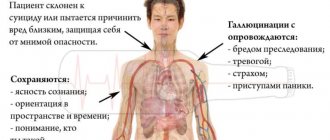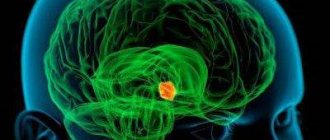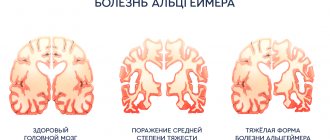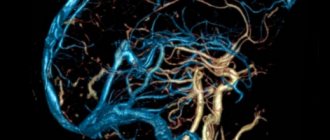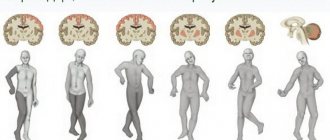Vascular dementia is not a disease as such, but a type of disorder of brain activity due to damage to the blood vessels of the circulatory system of the brain.
Such disorders are cognitive in nature: this means that no physiological disorders are noted, but the behavior and thinking of a person changes, who begins to exhibit inappropriate behavior of varying degrees of severity, his personality is destroyed, and the patient himself may not even realize what he is doing.
All this leads to a significant reduction in the patient’s life expectancy and gives reason to assign such people a disability.
Forecasts depending on the type of disease
During therapy, you can only slow down the development of the disease, but treatment at the initial stage in 15% of cases even allows you to completely get rid of the pathology, but this depends on the state of the vascular system and the reasons why the disease develops.
The maximum lifespan of a person diagnosed with vascular dementia is no more than 15 years, provided good care and quality treatment are provided.
When calculating life expectancy in the event of vascular dementia, the type of disorder and the presence of concomitant disorders must be taken into account:
- If vascular dementia is accompanied by Alzheimer's disease, confident predictions can be made for the next 5-6 years. In some cases, people live longer, but experts consider such situations to be exceptions. It all depends on the age at which the disorder first appears: in people under 65-70 years of age, the disease progresses slowly, and patients live for about another 10-15 years. If dementia is diagnosed in the eighth or ninth decade, these periods are reduced by two to three times.
- The vascular form can develop in the later stages of Parkinson's disease and the pathology progresses faster in this case. With this diagnosis, death can occur within the next 3-5 years.
- In Huntington's disease (a genetically determined lesion of the nervous system), moderate or severe vascular dementia may also occur. But since vascular dementia of this type develops steadily and very slowly, it is impossible to say exactly how long patients with a similar diagnosis will live: doctors can guarantee about another 10-15 years of life.
- Dementia with Lewy bodies is an independent type of disease. This is a severe form, which, although it begins with mild cognitive impairment, still leads to serious personality disorders. According to statistics, people with this disease live no longer than seven years.
- With the frontal form of the pathology, which due to hormonal imbalances can manifest itself for about fifty years, people can live up to fifteen years, or they can die after three years. This mainly depends on the severity of the dementia.
Regardless of the type of disease, the patient's life expectancy may be longer if he has no other health problems and is provided with good care and treatment. But it also happens that only a few months pass from the moment of diagnosis to death.
Impact of comorbidities
How long do people live with dementia? When predicting how long a person with a similar nervous system disorder will live, it is worth paying attention to the origin of the diagnosis. Thus, about 5% of all cases of the disease are reversible.
When dementia is caused by a tumor or infection, after getting rid of it, life expectancy can increase significantly.
In addition, mental disorders are sometimes caused by a lack of folic acid or vitamin D. By taking these substances, the patient can get rid of the symptoms of a frightening disease.
After a stroke
After a stroke, 10-30% of patients begin to develop signs of dementia:
- problems with memory, speech, reading and counting,
- slow movement, sudden changes in direction while walking,
- instability of emotional state, depression.
The mortality rate after a stroke in patients with dementia is three times higher than in patients who simply had a stroke.
However, timely use of medications and prevention of recurrent strokes can extend the life of an elderly person with symptoms of this disorder to 5-10 years or more.
Bedridden patients
While ambulatory patients with “senile dementia” can harm themselves by forgetting to turn off the gas or getting lost on the street, bedridden patients are at lower risk and can live 10 and sometimes 15 years.
Competent care and willingness to quickly come to the aid of an old man will significantly improve the quality and duration of his existence.
To prolong the life of a bedridden patient with dementia, it is very important to properly maintain personal hygiene: wash your hands, body, brush your teeth, genitals after going to the toilet, etc.
In order to pay sufficient attention to an elderly person, his relatives often use the services of a nurse with a special education. In addition, there are boarding houses that are ready to accept people with this diagnosis.
Find out more about dementia:
- its congenital and acquired varieties,
- symptoms in older people, manifestations in men and women, causes of development in children and adolescents,
- special tests to detect dementia, treatment methods in old age,
- do they give disability for dementia and how to apply for it,
- how to behave with sick people, his family and friends.
For Alzheimer's disease
In 70% of recorded cases, Alzheimer's disease leads to the development of senile dementia. As the disease progresses, it manifests itself as a decrease in the number of interests, slower thinking and motor reactions, increased irritability, and passivity.
Over time, hallucinations and paranoid ideas are added. In some cases, epileptic seizures occur.
Unfortunately, irreversible changes in the brain are accompanied by a persistent decline in previously acquired skills of independent existence.
The life expectancy for Alzheimer's disease complicated by dementia is 5-7 years. In severe forms (pronounced apathy, loss of speech skills, difficulties with movement), patients can live 1-3 years.
How long do people live with Alzheimer's disease? Find out from the video:
Vascular form of dementia
The occurrence of vascular dementia in old age can occur against the background of circulatory disorders (atherosclerosis, arrhythmia, pathology of the heart valves, hypertension, etc.).
Brain cells that lack nutrients and oxygen die off. Patients are subject to constant depression and absent-mindedness, increased fatigue, irritability, and sleep disturbances.
The life expectancy forecast for severe vascular dementia is on average 4-5 years, for a mild stage and slow development - from 10 to 15 years.
In approximately 15% of cases, complete recovery is possible.
Death is most often caused by a heart attack or stroke, so to prolong life it is worth paying more attention to the prevention of these ailments.
In people at a young age
Unfortunately, not only old people, but also young people at an early age, 28-40 years old, face a disease such as dementia. A mental disorder can develop due to an unhealthy lifestyle.
Modern youth are often susceptible to destructive behavior, which includes various bad habits and addictions. As a result of smoking, gambling, alcohol or drug use, brain activity slows down.
If the first symptoms of the disease are detected, there is a chance to prevent the progression of dementia and completely cure the patient. However, most often it is only possible to slow down severe mental changes and prolong the years lived by constantly taking medications.
The average lifespan with moderate development of mental decline and the use of symptomatic therapy will be 10-20, in some cases 25 years.
In severe cases, as well as with a genetic predisposition, the disease develops more rapidly and can lead to death in just 5-8 years.
Disability group
The development of the disease leads over time to the complete disintegration of the personality, when the person is no longer responsible for his actions. But the ability to adequately perceive reality and work fully is lost much earlier, and in connection with this, such people are issued with a disability.
This procedure takes place under the control of the patient’s authorized representative, and all actions of the relevant authorities are notarized.
The possibility of obtaining disability with such a diagnosis is regulated by Decree of the Government of the Russian Federation No. 247 of 2008.
According to this document, disability of the first group is assigned, and if moderate or severe vascular dementia is immediately diagnosed, the examination and registration occur once.
Patients do not need to undergo annual re-examination, as happens with a mild form or the initial stage. This is due to the fact that in the early stages there is little chance of cure, and the patients themselves may still remain able to work for some time.
Disability is assigned after providing supporting documents to VTEC employees (medical labor expert commission). The documents themselves are drawn up by representatives of the MSEC (medical and sanitary examination), and the basis for issuing such papers are certain requirements in relation to the patient:
- inability to perform simple actions when servicing your needs;
- the need for regular rehabilitation activities;
- lack of orientation in space;
- inability to move without assistance;
- lack of behavior control;
- obvious mental disorders;
- potential danger to others and oneself.
Life expectancy with vascular dementia
Vascular dementia is a severe form of the disease. Dementia is caused by vascular disease, often develops after an ischemic cerebral infarction or hemorrhagic stroke, with atherosclerosis or hypertension; factors in the development of this form of the disease can be heart defects, high lipid levels and other disorders. Vascular dementia affects men more often.
Adequate treatment can help prolong the patient's life, but the disease cannot be completely cured, since the processes taking place in the brain are irreversible. In the case of vascular dementia, it is impossible to give an accurate prognosis for life expectancy. Some patients live several months after diagnosis, while others live several years. Often patients die from concomitant diseases - heart attack, stroke.
In dementia accompanied by Parkinson's or Huntington's disease, the prognosis depends on adequate treatment of these diseases. Most often, dementia with such concomitant diseases is not characterized by rapid progression; the life expectancy prognosis is several years, with Huntington's disease - up to 10-15 years. Dementia with Lewy bodies is a rapidly progressive disease with a life expectancy of about 7 years.
Mechanism of development of cognitive impairment
Dementia and stroke inextricably accompany each other in varying degrees of clinical severity. There are two main pathogenetic links in acute cerebrovascular accident:
- As a result of blockage of the lumen of a blood vessel by an atherosclerotic plaque, thrombus or atherosclerotic masses, a lack of blood appears in the brain and an ischemic stroke is formed, vascular-type dementia in 30% of cases.
- When the wall weakens, a protrusion (aneurysm) appears, and arterial or intracranial pressure increases, the risk of hemorrhagic stroke with rupture of the hemovascular membrane is high.
Dementia after hemorrhagic stroke or ischemic cerebral infarction has an extremely high risk when more than 50 ml of brain volume is affected. Cognitive disorders manifest themselves acutely, noticeable in the first 3-6 months. The development of changes after six months can be attributed to another type of dementia.
Clinical relevance
After a single stroke, cognitive impairment may not change in severity, but in some cases there is a slow decline. A step-like course is typical and often has the same localization, severity and etiological factor.
People over 60 years of age may experience so-called “silent” strokes located in the white matter of the brain. Etiologically they manifest themselves against the background of a sharp decrease in blood pressure (collapse), diseases of the heart and coronary vessels, and other severe somatic pathologies. It is perceived as senile dementia, clinically manifested as forgetfulness, inability to dress independently, prolonged mindless walking, inability to recognize a close relative the first time, etc.
When dementia occurs after a stroke, how long they live is directly related to repeated episodes of acute cerebral circulatory disorders. High mortality with recurrent stroke after 3-6 months. The risk of death is in every 2-3 patients.
Flow options
Epidemiological observations show that the risk of dementia increases with recurrent stroke.
Post-stroke cognitive disorders are heterogeneous. The heterogeneity of neurological, psychological characteristics and natural dynamics after an acute cerebral catastrophe is noted. Variants of post-stroke cognitive impairment
| Cause | Description |
| Single stroke | Damage to the so-called “strategic” zones and the sharp development of dementia after stroke are registered only in 5% of cases as a result of a single cause. This rare variant is characterized by neuropsychological characteristics when affecting a certain area:
|
| Decompensation of existing vascular dementia | This type of dementia is most often recorded, accounting for 40% of all cases after a stroke, the prognosis of the disease is relatively favorable. With additional rehabilitation measures, it is possible to maintain vital and cognitive functions. Clinically – slowing of motor speech and mental reactions. |
| Mixed vascular-degenerative lesion | Cognitive functions are simultaneously depressed, and the neurodegenerative process is often difficult to recognize. The mixed variant progresses rapidly, mnestic disorders are noticeable as in Alzheimer's disease (disadaptation, dysmnesia, amnesia, confabulation*), decreased intellectual productivity, apathy. |
*confabulation – replacing memory lapses with fictitious actions.
Life expectancy for other types of dementia
Dementia can be caused by various diseases. Very often, senile dementia is associated with Alzheimer's disease. In this case, the patient’s age plays an important role: the older the patient, the slower the disease progresses; The younger the patient, the more the disease progresses. The average life expectancy of a patient with Alzheimer's disease is about 6-10 years from the time of diagnosis. Much depends on the age and stage of the disease, the individual characteristics of the body.
The patient's life expectancy is affected by care and activities with the patient. It is very important that a person does what he loves: read, solve crosswords, draw, listen to music. He should not be in an environment of stress or anxiety. The more the patient engages in intellectual activity, the greater the chance of maintaining intellectual thinking, the ability to care for himself, and leading a normal lifestyle for a long time.
Adequate treatment prescribed at an early stage of the disease can significantly prolong life and alleviate the condition. Specialists from the neurology department of the Yusupov Hospital have extensive experience in treating dementia and many other related diseases. Modern diagnostic equipment makes it possible to determine the areas of brain damage and the degree of development of dementia. The use of innovative world-class techniques at the Yusupov Hospital can improve the quality of life for patients with dementia.
Vascular dementia in the elderly: symptoms by type
- Acute-onset vascular dementia begins after a series of strokes or as a result of blockage of blood vessels with the formation of plaques and the accumulation of blood clots. Embolism or hemorrhage can also be the cause. The expression largely depends on the focus. This could be some kind of aphasia, apraxia, acalculia and affective disorders.
- Multi-infarct dementia tends to increase gradually, and this happens after a series of ischemic episodes. The clinical picture can be varied. Patients feel dizzy, faint, experience headaches and nausea. Possible numbness of the limbs. They experience a general decline in cognitive abilities, emotional lability, memory impairment and similar symptoms.
- Subcortical vascular dementia is caused by ischemic dysfunction in the deep white matter structures, while the cortex is spared. It is believed that the duration of the disease can last up to 20 years, and it can begin in the period from 45 to 70 years. Has external signs that are somewhat reminiscent of signs of Parkinson's disease: the same gait, unsteadiness, bradykinesia. Patients age much faster. Another feature of this type of dementia is non-standard intellectual-mnestic disorders. Thus, difficulties usually arise with working memory, but the memory of the distant past is retained, and in this case, what happened before is first forgotten.
- Mixed cortical and subcortical vascular dementia produces a complex and confusing symptom complex. It is determined on the basis of a large set of examinations, including an autopsy.
Worth seeing: Dissociative Fugue
Vascular dementia can be combined with other diseases. When they say that it needs to be differentiated from Alzheimer's disease, they do not rule out that both of them may be present, but require different methods of therapy. Typically, a combination of Alzheimer's disease and multi-infarct dementia or some other type is identified primarily by the presence in the medical history of records of previously discovered transient circulatory disorders and neurological disorders. The nature of the flow also changes, for example, a sharp onset and further stepwise development with a change in state in a short period.
Vascular dementia can be combined with other similar diseases
Life expectancy in early dementia
Life expectancy at an early stage of the disease largely depends on the age of the patient. The younger the patient, the more complex and faster the disease progresses. In older people, the disease does not develop as quickly. Detected dementia at an early stage allows you to remain in adequate condition for a long time and take care of yourself. Manifestations of dementia at an early stage are:
- forgetfulness,
- slight mood swings,
- slight decrease in intelligence.
Life expectancy of bedridden patients with dementia
Bedridden patients with dementia are most often people who are at an advanced stage of the disease. Bedridden patients with dementia often die from pneumonia and sepsis, concomitant diseases already at a severe stage of dementia. The prognosis for dementia in bedridden patients is unfavorable, the condition is complicated by physical inactivity, impaired mental activity, and circulatory disorders. Patients in serious condition are completely dependent on outside care; dementia is complicated by other diseases due to the patient’s immobility. At the Yusupov Hospital, relatives of the patient are trained. Caring for bedridden patients is complex and requires patience and knowledge about the characteristics of the disease.
Risk factors for vascular dementia
People who develop vascular dementia often have a history of one or more of the following: heart attack, stroke, high blood pressure, diabetes, or high cholesterol. In particular, if a person has a history of multiple strokes, the risk of developing vascular dementia increases as the number of strokes increases over time.
Other factors that may increase risk include smoking, atrial fibrillation, and a family history of vascular dementia.
Life expectancy of patients with dementia with optimal treatment
Life expectancy with dementia depends on the adequacy of treatment and care. At the first stage, the doctor prescribes diagnostic tests to differentiate dementia from other diseases. Treatment of senile dementia is based on eliminating the symptoms of the disease and reducing the risk of dementia progression. Dementia is an incurable disease, the course of which depends on many factors - age, gender, type of dementia, concomitant diseases, adequate treatment and care. A calm environment and lack of stress help reduce the risk of progression of senile dementia.
Doctors recommend a special diet, vitamin therapy, music therapy, aromatherapy, acupuncture and other methods that improve brain activity. The average life expectancy of a young patient with dementia can be about 7 years; older people with dementia live on average from 7 to 15 years. By contacting the Yusupov Hospital, you will receive medical care at the European level: they will carry out the necessary diagnostics, select the optimal therapy and rehabilitation program.
You can make an appointment with a neurologist by phone.
Dementia is an acquired dementia that develops as a result of organic damage to the brain. Affecting not only the senile age group, the disorder has its own classification, stages of development and a corresponding prognosis for survival after its identification.
The further fate of a person diagnosed with dementia largely depends on the type of disorder. He also determines the subsequent medical strategy aimed at slowing down the process and relieving unpleasant accompanying symptoms.
Treatment
For a pathology such as dementia after a stroke, treatment is prescribed immediately with an individual selection of medications. Includes vascular, replacement and neurometabolic therapy, as well as secondary preventive measures to reduce the risk of recurrent stroke.
A prerequisite is lifestyle correction and treatment of diseases of the cardiovascular system:
- Personal selection of antihypertensive medications.
- Prescription of antiplatelet agents (Clopidogrel, Acetylsalicylic acid, Pentoxifylline).
- Anticoagulants (Warfarin).
- Correction of the lipid profile reduces the risk of atherosclerotic plaque formation: Lovastatin, Rosuvastatin.
- Vasoactive agents: Vasobral, Tanakan, Cinnarizine.
To reduce the risk of dementia, neurometabolic therapy using nootropics is indicated: Piracetam (Nootropil), Actovegin, Cerebrolysin. The drugs have low toxicity and high bioavailability to organs and tissues. Anticholinesterase drugs slow down destructive processes (Galantamine, Rivastigmine).
The main reasons for the development of pathology
Organic brain damage occurs due to the natural aging of the human body. The cause of the phenomenon is also disturbances in the functioning of the thyroid gland, a number of somatic diseases, neurological and vascular pathologies.
Alcoholism and drug addiction can also provoke dramatic changes in the central nervous system. Poisoning with chemicals at work if personal safety rules are not followed can have devastating consequences for the brain.
Strokes of both types, various head injuries, and brain tumors can also lead to dementia. Sometimes the cause of increasing dementia is taking medications, after which the symptoms gradually subside. In this case, we can talk about reversible dementia.
Dementia and its classification
The pathology in question has different classifications. Since dementia is a consequence of brain damage, its types are determined by the underlying disease. One of the division options is:
- Atrophic dementia. It is provoked by Alzheimer's and Pick's diseases. Initial destructive processes occur in the nerve cells of the central nervous system (CNS).
- Vascular dementia. It is provoked by changes in the lumen of blood vessels and hypertension. Cholesterol plaques in the vessels can lead to disturbances in the blood supply to the brain (possibly to a stroke) and, as a result, to the gradual development of dementia.
- Dementia of mixed type. The development mechanisms resemble the atrophic and vascular variants.
- Alcoholic. Occurs due to constant consumption of alcoholic beverages.
Dementia develops in older people for various reasons. First of all, we are talking about organic damage to the areas of the brain responsible for memory and thinking. Alzheimer's disease serves as a background against which dementia occurs - a typical case in the elderly. It is extremely rare that the disease is diagnosed at an earlier age.
The relationship between stroke and dementia
Traditionally, clinical manifestations after the onset of cerebral catastrophe are associated with neurological deficits. In practical terms, they are given more attention during therapy to avoid the risk of disability and to improve the patient’s quality of life. However, focal changes are almost always combined with mental and cognitive disorders. Additional domestic, social and professional adaptation is required.
Vascular dementia after a stroke is caused by disruption of normal blood flow and blood supply to the blood vessels. “Strategic” areas of the brain suffer from a lack of nutrients, vitamins, macro- and microelements. A cause-and-effect relationship proving a high risk of dementia after stroke:
- young people (up to 40-45 years old) after a single or multiple case of vascular accident, where the likelihood of Alzheimer's disease is reduced to zero;
- cognitive properties were preserved before stroke and were impaired immediately after the pathology, in addition, they continue to progress over the next 3-6 months;
- according to the results of a clinical examination, magnetic resonance or computed tomography, the lesion is located in a strategically significant area (areas of the brain under the cortex);
- a history of vasculopathy was diagnosed.
The risk of developing dementia depends on many predictors. Risk factors for dementia: age, lifestyle, gender, low level of education, untreated hypertension and diabetes, heart and vascular diseases. In addition, the risk of post-stroke dementia increases with repeated cerebral crisis, severe and extensive damage, and localization features affecting extremely important structures.
Important! In most cases, there is a combination of risk factors and increased mutual influence, but not their summation.
Dementia in the elderly after a stroke at the age of 60-70 years develops in 16-17% of cases, in patients aged 70-80 years the risk of complications is 29-30%, over 80 years - 37-40%.
Early manifestation of the disease
Because dementia develops gradually, it is almost impossible to detect it in the early stages. But the life expectancy prognosis depends on the stage of development of dementia. First, memory for recently occurring events deteriorates, and we are not talking about simple forgetfulness, which occurs in a healthy person. The speed of reactions decreases, and the fact that it is difficult for the patient to find words during a conversation comes to the fore.
Sometimes a sick person manages to skillfully hide problems discovered in himself, avoiding difficult actions. But a decrease in interest in any activity (reading, for example) betrays the patient. Character also changes, stubbornness, conservatism in views, stinginess, etc. may appear. A person’s moral qualities also suffer - spiritual values depreciate, the sense of shame disappears. Over a long period of time, gestures and some behavioral characteristics of a particular person may persist.
Final stage of the disorder
Patients in the last stage of dementia before death are characterized by severe exhaustion and tremors of the limbs. Self-care is impossible even for basic things - a person cannot eat, go to the toilet, or carry out hygiene procedures.
Hallucinations and delusions also occur at this stage. The main task of the nursing staff, if the patient is in a medical facility, is to minimize the patient's suffering. The final stage makes proper care at home almost impossible. Death occurs within a year after the onset of the last stage of the disease.
Progression of senile dementia
Senile or senile dementia can be invisible at a quick glance and superficial communication with the patient. Previous forms of behavior, gestures and intonation may remain, but the disease has already manifested itself. The problem can be revealed if an old man is asked a completely random question - about his age, the place where he is. A healthy person will answer without difficulty, but someone affected by senile dementia will experience difficulties or make a mistake in the answer.
Unlike the vascular variant of the disease, senile dementia in older people does not often cause psychotic states. The absence of hallucinations and delusions makes the course of the disease easier for both the patients themselves and those around them. Signs of psychosis in the senile age group sometimes still occur and are accompanied by sleep disturbances - insomnia or temporary shifts in the schedule.


